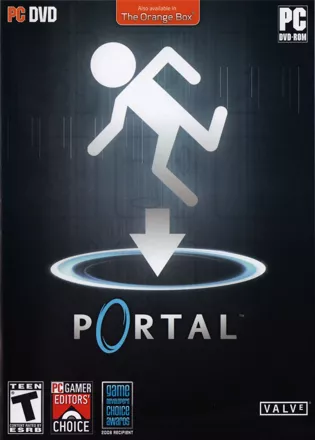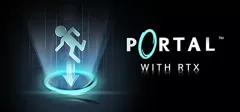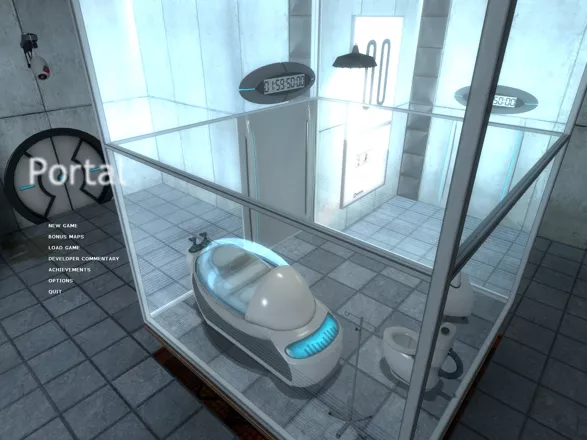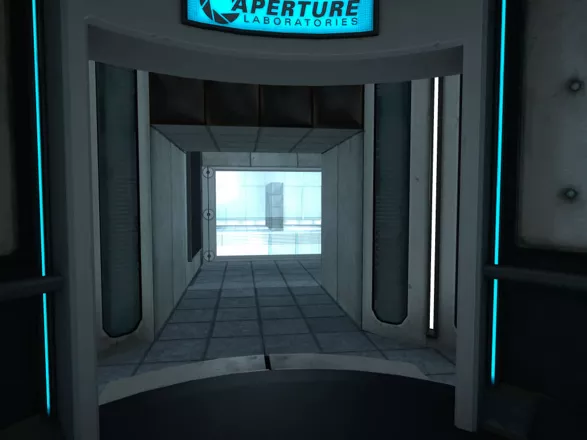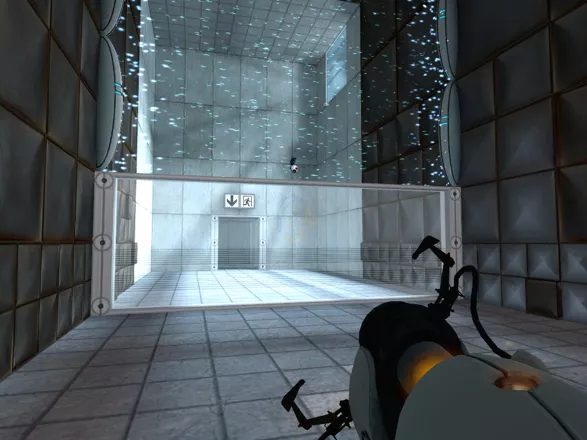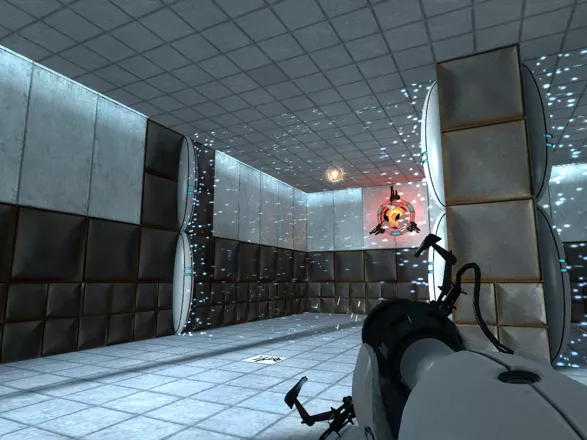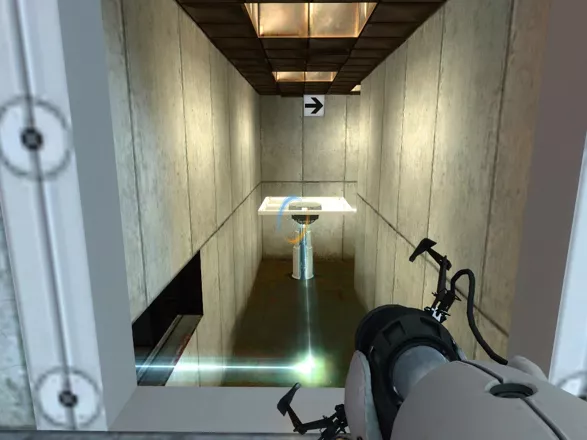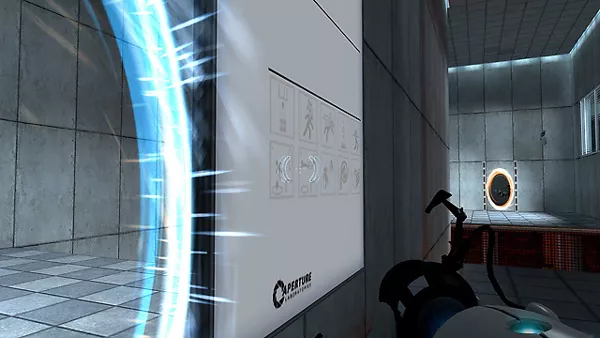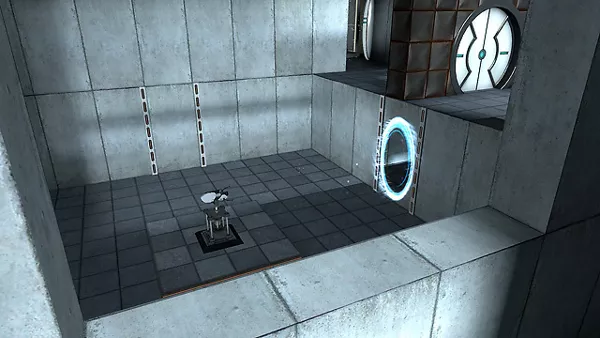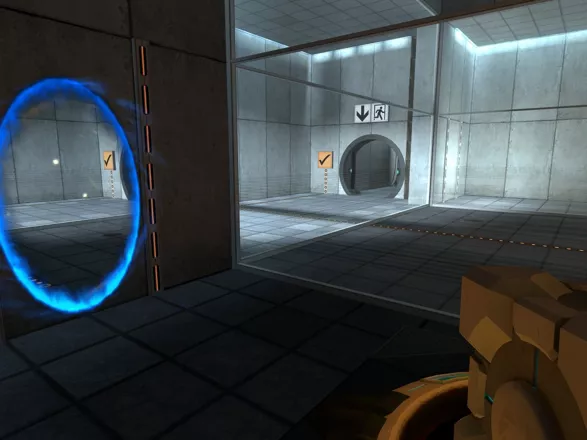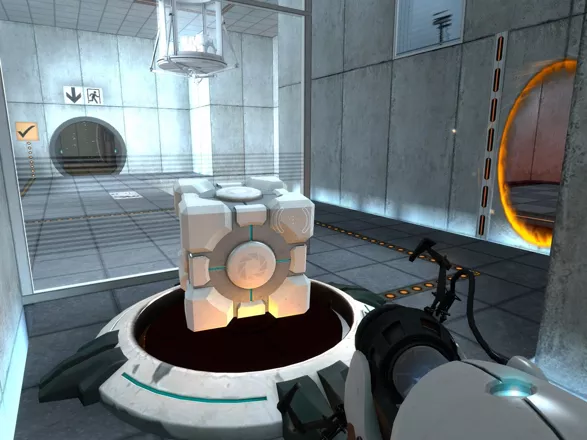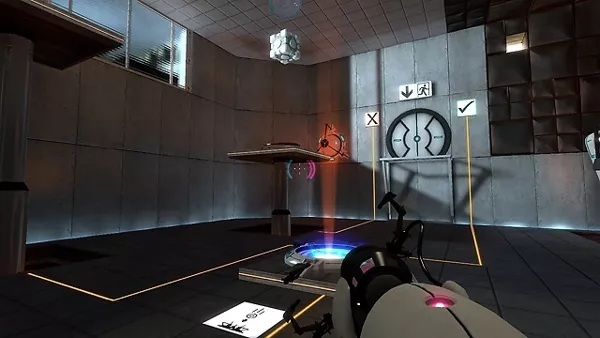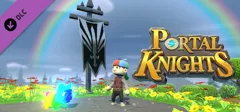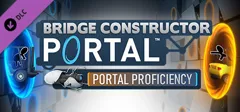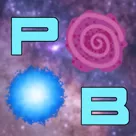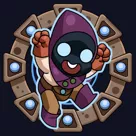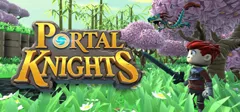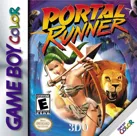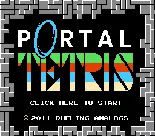Portal
Description official description
Aperture Science is a secret weapons research organization in competition with Black Mesa. Chell is a test subject at the "Enrichment Center" facility who awakens to find an A.I. construct called GlaDOS requiring some tasks to be completed. They are testing the Aperture Handheld Portal Device (aka Portal Gun) which is able to create portals in space, allowing Chell to move from one point to another without actually crossing the distance. Chell is promised cake should she be able to overcome the obstacles and perform the necessary tests.
She has to use her new gun to fling, jump and fall her way through 19 puzzles. These include obstacles but also androids that fire at her. Although the game is played as a first-person shooter, a large amount of strategy and puzzle-solving is involved. After completing the game, two additional game modes become available: Challenge where the game needs to be completed in either as little time, as few footsteps, or as few portals as possible. The other mode is Advanced, where levels are made harder through additional obstacles.
Portal is set in the Half-Life universe and it is considered the spiritual successor to Narbacular Drop, some of whose original developers worked on this game. The Windows game can be bought stand-alone, while the Xbox 360 and PlayStation 3 versions are only available in The Orange Box.
Spellings
- ポータル - Japanese spelling
- 포털 - Korean spelling
Groups +
Screenshots
Promos
Videos
Add Trailer or Gameplay Video +1 point
See any errors or missing info for this game?
You can submit a correction, contribute trivia, add to a game group, add a related site or alternate title.
Credits (Windows version)
171 People (164 developers, 7 thanks) · View all
Reviews
Critics
Average score: 87% (based on 41 ratings)
Players
Average score: 4.2 out of 5 (based on 274 ratings with 6 reviews)
The Good
The story was amazing, and the fact it used artificial intelligence as the main enemy of the game was exactly what I was looking for at the first time I played it. I would watch every lets-play on youtube as many times as possible as I waited to actually buy the game- and when I did I was so happy to get it that I beat it in a matter of three days. I love how the gameplay was, and how not every 'chamber', or test level, was easy and how you had to use your mind for quite a few of them.
The Bad
I really didn't like how short the game was in general. They could have added a lot more interesting things to the first game and still had it lead up to the seemingly even more popular sequel. Personally, I could play through this game with my eyes closed- I memorized the levels since I played it through so much, and over time it just got flat out boring.
The Bottom Line
Personally, this game is one of the coolest games I've played in awhile. Sure, it has some pros and cons about it and its not all completely amazing. Sure, it gets boring after awhile for people like me, but it is definitely worth getting.
Windows · by Mae Spencer (4) · 2011
Fun but extremely overrated casual-type puzzle game
The Good
I got Portal through a free download promotional offer on Steam, so I really can't complain about value for money. I didn't really know anything about it except that I was aware of its positive reception back when it was released. Since I'm almost exclusively a retro gamer, I also took this as an opportunity to try out one of the very high-tech recent games to take advantage of my GeForce 9600, which has not seen any real load for the past two years since I bought it.
As it quickly turned out, this is actually a pure logic puzzle game. Your task is essentially to find your way through a three-dimensional level from the single entry point to the single exit point. The tricky part of this is to move between platforms that you can see but which are either vertically on a different level than you are or which are on the same level but horizontally removed from where you are standing (so there is a chasm between the two platforms). Unlike other platform puzzle games, you can neither jump nor climb ladders or ropes to reach a different platform. Sometimes you can use an elevator, but mostly your only way is either to fall on the platform you want to get to (which obviously only works downward) or to open a 'portal' between one of the walls of your current platform and a wall of the platform you want to reach by pointing the device you are carrying (the 'portal gun') to the the positions where you want the two openings of the two-way portal to appear and pushing the fire button. Or you can also create one end of your portal on the ceiling above the platform where you want to go and you can fall through that ceiling if you walk through the other end. Simple as that.
There are very few other elements in the game: Walls that you can't open a portal on (which are clearly distinguished from those that can be used for portal). Buttons you have to push to get sliding platforms moving. Stationary things that fire various (slow or fast) missiles that you have to avoid or that you have to use cleverly to destroy obstacles in your way. Floor switches that you have to put boxes on to open doors you couldn't get through otherwise. Deadly floors that you must not fall on. And finally the very clever use of gravity as a game mechanic in the maneuver called 'flinging' which is the only way to (sort of) jump in this game higher or longer than a foot or so.
There really isn't much in this game that we haven't seen before. Portal is basically like any other puzzle platformer (think Rick Dangerous, Lost Vikings, and so on), the main difference being the fact that it's a 3D world, which is of course by no means a trivial thing. Nor is the fact that this isn't such a revolutionary game (contrary what most reviews want you to believe) a bad thing as long as it's fun.
Getting into the game was very straightforward. The learning curve was VERY nicely balanced, new concepts (like how to move boxes on floor switches) are introduced step by step and are very easy to grasp this way About a quarter into the game you have learned everything needed to solve the later puzzles. The difficulty of the puzzles then steadily increases until you reach about half of the game (the 19th 'test level') and remains about constant from that point on. Difficulty is very manageable throughout the main game. There are a few tricky stages that you have to try over and over again until you solve them, but it never really becomes frustrating.
The story as such isn't really integral to the game, but it's entertaining nevertheless. Your aim in solving the puzzles is to defeat the rogue AI that tries to kill you. This AI called GLaDOS keeps talking to you throughout the game - think System Shock. But unlike System Shock, Portal isn't scary at all but funny. Many of the AI's lines, as well as the song she sings for the player during the end credits, are hilarious, and her voice acting is also extremely good. These two things (in addition to some other jokes you come across) are easily the two most memorable aspects of Portal, rather than the gameplay itself.
This is a short game. Some reviewers claim that they finished it in 2 to 4 hours. For me it took somewhere between 7 and 8 hours, although I didn't feel like I was being particularly lame. This is actually a good thing, since it's fun while it lasts but I wouldn't have wanted to spend like 30+ hours playing this.
One reason why the game can be finished so quickly is that you can save anywhere. This is something definitely to be applauded. Other studios/publishers would probably have introduced fixed saving locations to force the player to replay larger parts of levels and thereby artificially extend the game time.
The Bad
The same thing I've always hated about 1st person platformers. You aren't aware of the body of your player character since the only thing you see is your gun. You can't even see your feet when you look straight down. But the point of a platformer is exactly to guide you player character precisely. If you don't know where the body of your player character exactly is, it's basically impossible to fall through portals to fling to difficult-to-reach platforms exactly like you would like this to happen. What's going on instead is that you try the same flings over and over and over again (quick-loading all the time), hoping that you'll accidentally get the trajectory right this time. This mostly works out eventually, but it's still extremely annoying. And there were in fact several situations in the game where I was simply unable to use a combination of portals to get to a platform that looked reachable that way. I always failed to reach the edge of the platform, but I never knew whether this was just because I wasn't falling through the portal the right way or whether it was physically impossible to reach that platform that way. I didn't even have an idea whether I was missing the platform just barely or I wasn't near its edge at all.
The graphics aren't particularly impressive, though that's of course not really relevant for puzzle games. They are functional and get the job done, so there's no real reason to complain. I just add this as a negative point because most players probably expect current FPS games to be chock full of eye candy. Portal isn't.
The presentation (the humor, the introduction of the game mechanics, the balanced learning curve etc.) is excellent, this is clearly a very solid game in this respect and up to Valve's standard, but what about the gameplay as such? This is obviously a very subjective question, but personally, I found Portal's gameplay just dull. I do like puzzle and other strategy games in general, and I've played several addictive games in this genre, but Portal definitely isn't one of them. In the second half of the game, especially, after you leave the test levels, there isn't really anything new or interesting going on in the game. It's just the same puzzles, or combinations of puzzles, over and over again, in just slightly different rooms.
Finally, though this is just an odd technical issue, I don't understand how on earth this game can occupy 5 GB of disk space. The whole environment is extremely 'sterile', as one of the developers put it in the audio commentary, so as not to distract the players from the puzzles. No fancy textures, no enemy models, no objects or decorations, no movies, not even cutscenes, just walls, platforms, and sometimes the odd fan, turret, piston or staircase you come across. Still, downloading the game from Steam took about as long as playing it through.
The Bottom Line
Contrary to what its MobyGames category says, this is no action game. It's a traditional platform puzzle game, just in 3D from a first person perspective. There is very little violence involved, which is a good thing, although blood splatters appear on the walls when you are hit by the guard robots' machine guns - I found this both out of place in this game and distasteful. There is very little time pressure in the game, and very few situations where proper timing or 'manual skill' plays any role at all. Portal is mostly about figuring out where to place your portals and in what order to move through the levels.
Overall both the gameplay and the tone of the game felt slightly similar to the classic Shiny games MDK and Messiah, both of which involve a lot of similar puzzle elements, gliding around on 3D levels, and humor. But contrary to Portal these are actually exciting and action-packed games that offer a lot of fun and never get dull (though they sometimes get extremely hard).
To sum it up, Portal is a fun and rather easy puzzle game that you can quickly get into and play through over one or two afternoons, much like the 2D level-based Flash puzzle games you can play for free on the internet. It's definitely worth playing for the jokes and a few memorable moments. But I'm glad I got it for free. I would be quite disappointed if I had paid $25 for it. The game isn't that good, it's very short, and there is very little reason to replay it.
Windows · by Ferragus (46) · 2010
Interesting idea, but not much of a game.
The Good
I haven't seen a fresher idea for a game mechanism in years. And to find one that actually leaves much up to the player's imagination is rare. The portal weapons work like a charm, as does the physics in the game.
The Bad
However, I can't shake the feeling that I'm playing around with a tech demo. I have a hard time calling it a game. Most gamers will probably finish it in a couple of hours and that only adds to the demo feeling of the "game".
The story is thin, vague and not much to spur the player on. I got this game for free but had I payed money for it I would have felt even more cheated. It's fun to play around with and the gameplay is superbly executed - but I just don't see a whole game in there.
The Bottom Line
Imagine a typical 3D shooter without weapons. Instead you have the ability to shoot portals on almost any solid surface. If you shoot one portal on the right wall, and the other on the left and then go through the right one - you will come out of the left portal. These portals can be applied to ceilings and floors as well.
Now, the traditional shooter becomes a puzzle game where you need to use the portals - and your imagination - to get from point A to point B.
Windows · by Thomas Helsing (182) · 2011
Discussion
| Subject | By | Date |
|---|---|---|
| Free until May 25th, 2010! (on Steam) | Patrick Bregger (299646) | May 23, 2010 |
| Valve re-writes the ending. | Starbuck the Third (22606) | Mar 5, 2010 |
| Steam can't so I can't play | Arachia Botanical | Nov 20, 2009 |
| Incorrectly grouped | vedder (70767) | Feb 17, 2009 |
| The Device Has Been Modified | xroox (3895) | Jan 17, 2009 |
Trivia
1001 Video Games
Portal appears in the book 1001 Video Games You Must Play Before You Die by General Editor Tony Mott.
German version
In some German versions, the colour of blood was changed to grey.
GLaDOS
According to a boardroom projection in the game, GLaDOS stands for Genetic Lifeform and Disk Operating System.
Awards
- Eurogamer (UK)
- December 28, 2009 - Game of the Year 2007* Games for Windows Magazine
- March 2008 - #1 Game of the Year 2007 (PC Game Awards)* GameSpy
- 2007 – Best Puzzle Game of the Year
- 2007 – Best Character of the Year (for GlaDOS)
- 2007 – Best Sidekick of the Year (for The Weighted Companion Cube)
- 2011 – #8 Top PC Game of the 2000s
- GameStar (Germany)
- March 28, 2008 - Most Innovative Game Mechanics in 2007
Information also contributed by jean-louis and LepricahnsGold.
Analytics
Upgrade to MobyPro to view research rankings!
Related Sites +
-
A Piece of Cake
An Apple Games article about the Macintosh version of Portal (May, 2010). -
ApertureScience
website of the fictional Aperture Science company with an alternate reality game -
Design Language: The Portal Paradoxes
Noah Falstein presents a comprehensive design critique of Portal - from intro to 'Still Alive'. -
MacGamer Review
A review of the Mac version of Portal by the news and review site, MacGamer (May 18th, 2010). -
Portal Is for lesbians
A look at the female cast and the influence on the theme, on Heroine Sheik (17th October 2007) -
Portal flash pack
A pack of custom maps for the game, based on the unofficial 2D flash version.
Identifiers +
Contribute
Are you familiar with this game? Help document and preserve this entry in video game history! If your contribution is approved, you will earn points and be credited as a contributor.
Contributors to this Entry
Game added by Dakota Bob.
Android added by GTramp. Linux added by Sciere. Macintosh added by Kabushi.
Additional contributors: PCGamer77, Sciere, Foxhack, Zeppin, lee jun ho, Patrick Bregger, FatherJack, Harmony♡.
Game added October 16, 2007. Last modified February 21, 2024.
